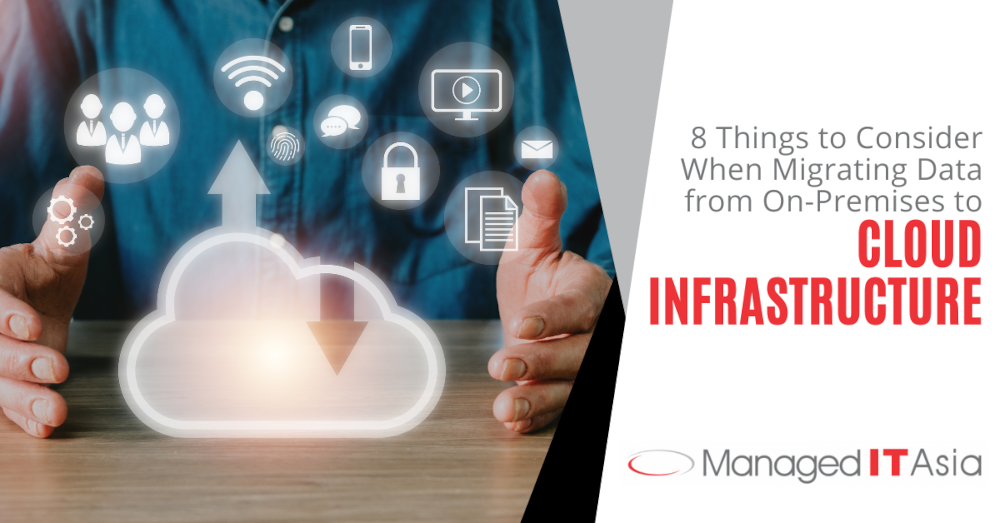Many businesses are migrating their data from on-premises infrastructure to cloud-based platforms. Cloud migration offers a range of benefits, including scalability, flexibility, and cost-effectiveness. But the process of migrating data from on-premises to the cloud can be challenging and requires careful planning. In this article, we will discuss some essential things to consider when migrating data from on-premises to cloud infrastructure.
1. Understanding the Types of Cloud Services
Before migrating data to the cloud, it’s important to understand the types of cloud services available. There are three main types of cloud services:
- Infrastructure as a Service (IaaS)
- Platform as a Service (PaaS)
- Software as a Service (SaaS)
IaaS provides virtualised computing resources, including servers, storage, and networking, while PaaS offers a complete development and deployment environment for applications. SaaS provides ready-made applications accessible over the internet. Understanding these types of services can help determine which service is best suited for the organization’s needs.
2. Evaluating Cloud Service Providers
When selecting a cloud service provider, it’s crucial to evaluate providers’ reliability, security, and compliance capabilities. Some cloud service providers offer more robust security features than others, such as encryption and authentication tools, and compliance certifications such as HIPAA or SOC 2. Additionally, it’s essential to assess the cloud provider’s reliability and service-level agreements (SLAs) to ensure that they meet the organization’s availability requirements.
3. Assessing the Migration Plan
Migrating data to the cloud requires a detailed migration plan. The migration plan should outline the data to be migrated, the migration process, and the timeline. It’s important to evaluate the impact of the migration on business operations, including:
- downtime
- potential data loss
- increased costs
A successful migration plan should include testing and validation procedures to ensure that the migration process works smoothly without any hiccups.
4. Ensuring Data Security
Data security is a critical concern during data migration to the cloud. Organisations should implement proper security protocols to ensure that sensitive data remains secure during and after the migration process. This includes using strong encryption algorithms and ensuring that all data transfers occur over secure channels. It’s also necessary that the cloud provider has adequate security measures in place to protect against potential data breaches.
5. Addressing Data Governance and Compliance
Data governance and compliance are critical considerations when migrating data to the cloud. Organizations must comply with data protection regulations such as GDPR and CCPA, and it’s essential to ensure that the cloud provider meets these compliance requirements. The impact of the migration on data governance policies and procedures should also be considered.
6. Ensuring Compatibility with Existing Applications
Organizations should ensure that their existing applications are compatible with the cloud platform before migrating data. It’s essential to assess the compatibility of the existing applications with the cloud service provider’s platform and ensure that any necessary adjustments are made. The cloud platform should also be able to support the organization’s future application development and deployment needs.
7. Managing Costs
Migrating data to the cloud can result in significant cost savings, but it’s important to manage costs effectively. It’s important to understand the cost structure of the cloud provider, including any hidden costs such as data transfer fees. Further, the potential cost savings of migrating data to the cloud should be evaluated, including the cost of maintaining on-premises infrastructure versus the cost of using a cloud-based platform.
8. Planning for Potential Challenges
Migrating data to the cloud can present various challenges, such as data loss, unexpected downtime, and security breaches. As such, it’s essential to plan for potential challenges before, during, and after the migration process. One way to do this is to conduct a risk assessment to identify potential threats and vulnerabilities. This can help organizations develop a contingency plan that addresses potential risks and outlines steps to mitigate them. Another possible challenge is the lack of expertise and experience in cloud migration. Organizations may not have the necessary knowledge or skills to carry out a successful migration to the cloud. In these cases, it’s recommended to work with a reputable cloud service provider with experience in cloud migration. Lastly, it’s helpful to consider the impact of the migration on employees. The migration process can be disruptive, requiring employees to learn new technologies and processes.
Migrate Your Data Safely
Migrating data from on-premises infrastructure to the cloud can offer a range of benefits, but it requires careful planning and execution. By understanding the types of cloud services, evaluating cloud service providers, assessing the migration plan, ensuring data security, addressing data governance and compliance, ensuring compatibility with existing applications, and managing costs effectively, organizations can ensure a smooth and successful data migration to the cloud. Working with a trusted and experienced cloud service provider will help ensure a seamless migration process that meets the organization’s unique needs. If you’re planning to migrate your data to the cloud, carefully consider all the factors discussed in this article. At Managed IT Asia, we have extensive experience in cloud migration services and can help you navigate the process. Contact us today to learn more about our cloud migration services and how we can help you achieve a successful migration to the cloud.
MANAGED IT ASIA, we are an IT Support, IT Solutioning and Managed IT Service Provider specializing in serving Small Businesses across Asia. Call us at +65 6748 8776 and let us manage your Small Business IT today!
